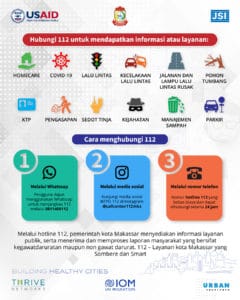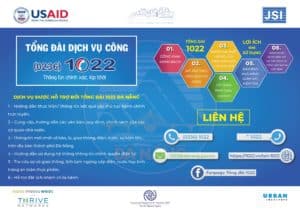Why Citizen Feedback is Important for Healthy Urban Planning
February 9th, 2022 | viewpoint
City living is never perfect. There will always be broken traffic lights and clogged drains. While governments cannot prevent these problems, the faster they can solve them, the safer and healthier citizens will be.
Governments, however, can only fix problems that they are aware of. Citizens can provide crucial, real-time data on service issues, but how can they convey this information to government officials? One way is through a citizen reporting system (CRS), which can come in many forms from call centers to mobile applications. These systems accelerate response times when three key criteria are met. First, all citizens must know about the CRS and how to use it. Second, all citizens must have access to it. And third, the city must respond to all requests in a timely and equitable fashion.
The USAID-funded Building Healthy Cities (BHC) project understands that connecting citizens to the government is a cornerstone of healthy urban planning. The project’s work to improve CRS started with assessments of people’s attitudes toward and use of two CRSs in Indore, India and Makassar, Indonesia, followed by recommendations for improvements. Among these were that both governments create communications campaigns to promote the knowledge and use of these platforms among marginalized communities, which were found to use CRS at below-average rates.
After completing the assessment in Makassar, JSI’s BHC team, with its partners in city government, developed a series of infographics to help citizens understand how and when to use the Makassar Call Center 112 reporting system. These materials have been shared on social media as part of a city-wide communication campaign. An animated video is also in development. BHC also hosted a radio talk show with Kominfo to convey information about 112, and developed training materials and trained call takers to respond to citizen complaints and engage appropriate city departments to resolve them. The project developed and is publishing a manual as part of the training process. The manual can be used to onboard staff in Makassar and ensure continuous improvement of the CRS. As more citizens use and see results from the call center, they will be more likely to use it in the future and recommend it to their neighbors.

In Indore, the BHC team focused on closing the gap between system use in lower- and higher-income areas. The team is using established community meetings in low-income neighborhoods to convey information and demonstrate how and when to use the city’s 311 app.
After meeting with BHC, the Indore Control and Command Center began to include CRS complaints in its interactive dashboard so that new reports are quickly brought to the government’s attention and service providers can be re-routed to the problem site.
Although BHC did not complete a full CRS assessment in Da Nang, Vietnam, the team was asked to support a communications campaign and develop a mobile application to increase awareness and use of Call Center 1022. The team developed a short video and infographics that are being shared widely across Da Nang and help citizens understand how they can remedy their city’s problems.

With increased access to digital technology, collecting information and feedback has never been easier. Everyone must take part in creating safe and healthy cities, and developing equitable and effective citizen feedback loops is one way to ensure that whole cities grow together. The Building Healthy Cities project will continue to work to empower all citizens to make important and sustainable changes to their environments.
We strive to build lasting relationships to produce better health outcomes for all.